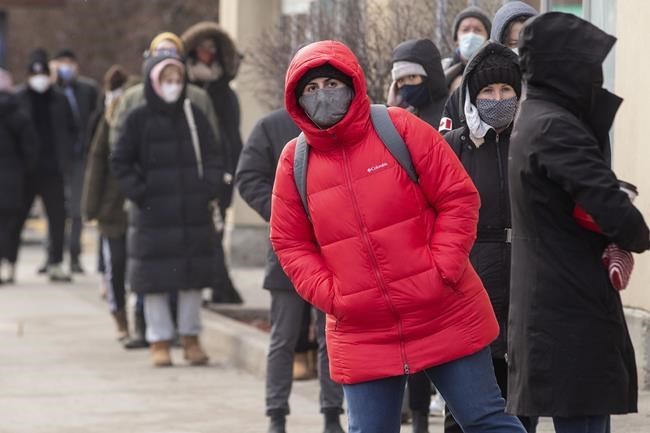More upswings in COVID-19 infections were reported Thursday in Ontario and Quebec, as a pair of British studies appeared to confirm earlier research suggesting the Omicron variant is milder than the Delta mutation.
Health officials in Ontario reported 5,790 new cases, a tally well above the previous single-day high of 4,812 recorded in April. The province also confirmed seven new deaths attributed to the virus.
Alberta reported 1,346 new cases of COVID-19 on Thursday, a daily figure not seen in the province since early October.
The province also reported a total of 2,131 Omicron variant cases, a rise of 522 from the day before. The Alberta government said there are 7,065 active COVID-19 cases and, of those, 4,687 are infections from a variant of concern.
The Quebec government reported 9,397 new cases Thursday — another record — and a rise of 28 COVID-19-related hospitalizations, for a total of 473. In Montreal, officials said one of every five Montrealers getting tested for COVID-19 was getting a positive result — and the latest data confirm that 90 per cent of infections in the city involve Omicron.
Dr. Mylène Drouin of Montreal public health said Thursday that 60 per cent of the positive cases in the city were among people between the ages of 18 and 44, adding that contact tracers cannot keep up with the crush of new infections.
"The message is we are having intense community transmission in Montreal," she told reporters. "It's exponential — it's touching young adults."
"Everyone has someone in their entourage who is infected with COVID right now, so we all have to be really vigilant to protect the vulnerable."
Meanwhile, scientists say the good news from the two British studies could be overshadowed by the fact that Omicron spreads much faster than Delta and is better at evading vaccines. As a result, the sheer number of infections linked to Omicron could still overwhelm hospitals.
An analysis of from the Imperial College London has found people infected with the variant were around 20 per cent less likely to go to the hospital than those infected with the Delta variant — and they were 40 per cent less likely to be hospitalized for a night or more. That analysis included all cases of COVID-19 confirmed by PCR tests in England in the first half of December in which the variant could be identified.
A separate study by scientists at the University of Edinburgh suggests the risk of hospitalization was two-thirds less with Omicron than Delta. But that study pointed out that the nearly 24,000 Omicron cases in Scotland were predominantly among younger adults aged 20-39. In general, younger people are much less likely to develop severe cases of COVID-19.
"This national investigation is one of the first to show that Omicron is less likely to result in COVID-19 hospitalization than Delta,'' researchers wrote. While the findings are early observations, "they are encouraging,'' the authors said.
"Cautious optimism is perhaps the best way to look at this,'' said Manuel Ascano Jr., a biochemist who studies viruses at Vanderbilt University in Nashville, Tenn.
The findings have not yet been reviewed by other experts, the gold standard in scientific research.
Data out of South Africa, where the variant was first detected, have also suggested omicron might be milder than the Delta mutation.
Several provinces had recently reinstated stricter public health measures in response to Omicron, including caps on social gatherings and closing some businesses.
Canada's public health officer, Dr. Theresa Tam, has confirmed the Omicron variant has become the dominant mutation of COVID-19 in several provinces. Infections across Canada have risen from an average of 5,000 per day last week to more than 11,000 this week, which is why Tam has called for urgent action to curb the spread of Omicron.
In Nunavut, public-health restrictions have been tightened in Iqaluit. They include a ban on non-essential travel in and out of the capital city. As well, the territory confirmed Thursday that the city's swimming pool, theatre and hair and nail salons had to close by noon and that all restaurants had to shift to takeout only.
Officials in Nunavut said the changes are necessary because a case of COVID-19 had been detected in a person who had not left Iqaluit for more than a month, a likely sign of community transmission.
In Saskatchewan, the province's Opposition New Democrats asked why the government has yet to announced new measures to deal with Omicron. NDP Leader Ryan Meili said he couldn't understand why Saskatchewan is the only province that hasn't taken any new steps, even though the government's modelling suggests Omicron cases could skyrocket over the next few weeks.
Meili noted that Saskatchewan has the lowest vaccination rate in the country.
This report by The Canadian Press was first published Dec. 23, 2021.
— With files from The Associated Press.
Michael MacDonald, The Canadian Press



